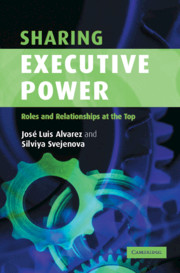Book contents
- Frontmatter
- Contents
- List of figures and tables
- Acknowledgments
- Introduction
- Part I Contingencies and roles in structuring corporate power
- 1 Contingencies of corporate power structures
- 2 Performing the “infinite job” solo: executive dilemmas, roles, and actions
- 3 Roles and relationships as parameters of corporate power structures
- Part II Small numbers at the top
- Conclusion: From small numbers to corporate governance regimes
- Appendix
- References
- Index
2 - Performing the “infinite job” solo: executive dilemmas, roles, and actions
Published online by Cambridge University Press: 22 September 2009
- Frontmatter
- Contents
- List of figures and tables
- Acknowledgments
- Introduction
- Part I Contingencies and roles in structuring corporate power
- 1 Contingencies of corporate power structures
- 2 Performing the “infinite job” solo: executive dilemmas, roles, and actions
- 3 Roles and relationships as parameters of corporate power structures
- Part II Small numbers at the top
- Conclusion: From small numbers to corporate governance regimes
- Appendix
- References
- Index
Summary
Managers need to be ambidextrous. Juggling provides a metaphor. It is only when the juggler can handle multiple balls at one time that his or her skill is respected.
Tushman and O'Reilly, 1996, p. 8Without the “superb politician” complex organizations would be immobilized.
Thompson, 1967, p. 143In this chapter we focus on one of the arguments for the existence of small numbers at the top of organizations: the numerous and demanding challenges to be faced and multiple and varying roles to be played by executives at the apex of complex organizations.
The ideal might be that jugglers and superb politicians manage and govern organizations, as the authors of the quotations heading this chapter wish, but such people are rare in the general population and even not common in the managerial class. Corporate political structures have to be designed for executives with average professional talent and motivations. We contend that the solo management of complex organizations requires above-average competencies. By solo, we mean the occupancy of an executive leadership position without role-sharing or without the support of a tightly knit constellation of executives – without any of the small-numbers schemes. Small numbers at the top, we suggest, should not be considered as a rare and unusual arrangement, but as a normal option for corporate political design.
- Type
- Chapter
- Information
- Sharing Executive PowerRoles and Relationships at the Top, pp. 63 - 83Publisher: Cambridge University PressPrint publication year: 2005



